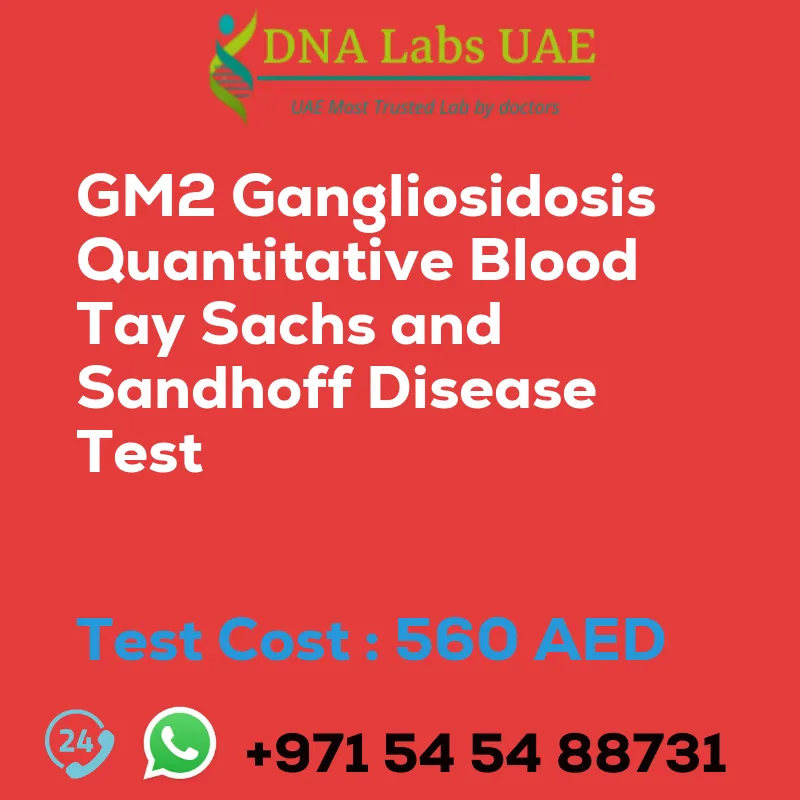GM2 Gangliosidosis Quantitative Blood Test
Welcome to DNA Labs UAE, a leading genetic lab specializing in diagnostic testing. Today, we will be discussing the GM2 Gangliosidosis Quantitative Blood Test, specifically focusing on Tay-Sachs disease and Sandhoff disease. These genetic disorders result in the accumulation of GM2 gangliosides in the body, leading to neurological symptoms and developmental regression.
Test Details
The GM2 Gangliosidosis Quantitative Blood Test is a diagnostic test used to measure the levels of GM2 gangliosides in the blood. This test involves drawing a blood sample from the patient and analyzing it in our state-of-the-art laboratory. The test specifically measures the levels of GM2 ganglioside A and GM2 ganglioside B.
Test Components
- Test Name: GM2 Gangliosidosis Quantitative Blood Tay-Sachs and Sandhoff Disease Test
- Price: 560.0 AED
- Sample Condition: 10 ml (7.5 mL min.) whole blood from 3 Lavender Top (EDTA) / Green Top (Sodium heparin) tubes. Ship refrigerated. DO NOT FREEZE. Clinical details must accompany sample.
- Report Delivery: Sample daily by 4 pm; Report 4 days
- Method: Enzyme Assay
- Test Type: Inborn Errors of Metabolism
- Doctor: Pediatrician
- Test Department: Genetic
- Pre Test Information: Clinical details must accompany sample.
Symptoms and Diagnosis
Tay-Sachs disease and Sandhoff disease are characterized by the progressive destruction of nerve cells in the brain and spinal cord. This leads to neurological symptoms and developmental regression. Symptoms may include muscle weakness, loss of motor skills, seizures, and cognitive decline. Diagnosis of these diseases is crucial for early intervention and management.
Confirmatory Testing
It is important to note that the GM2 Gangliosidosis Quantitative Blood Test is not a definitive diagnostic tool for GM2 gangliosidosis. Further confirmatory testing, such as genetic testing or enzyme activity assays, may be required to confirm the diagnosis.
Monitoring and Treatment
In addition to diagnosis, this blood test can also be used to monitor the progression of the disease and the effectiveness of treatment in individuals already diagnosed with GM2 gangliosidosis. Regular testing and close monitoring are essential for managing these conditions.
At DNA Labs UAE, we are committed to providing accurate and timely genetic testing services. Our team of experts is dedicated to helping healthcare professionals and patients in the diagnosis and management of genetic disorders. Contact us today to learn more about our services and to schedule an appointment for the GM2 Gangliosidosis Quantitative Blood Test.
| Test Name | GM2 GANGLIOSIDOSIS QUANTITATIVE BLOOD TAY SACHS and SANDHOFF DISEASE Test |
|---|---|
| Components | |
| Price | 560.0 AED |
| Sample Condition | 10 ml (7.5 mL min.) whole blood from 3 Lavender Top (EDTA) \/ Green Top (Sodium heparin) tubes. Ship refrigerated. DO NOT FREEZE. Clinical details must accompany sample. |
| Report Delivery | Sample Daily by 4 pm; Report 4 days |
| Method | Enzyme Assay |
| Test type | Inborn Errors of Metabolism |
| Doctor | Pediatrician |
| Test Department: | GENETIC |
| Pre Test Information | Clinical details must accompany sample. |
| Test Details |
The GM2 gangliosidosis quantitative blood test is a diagnostic test used to measure the levels of GM2 gangliosides in the blood. GM2 gangliosidosis refers to a group of genetic disorders that result in the accumulation of GM2 gangliosides in the cells of the body, particularly in the brain and nervous system. The test is primarily used to diagnose Tay-Sachs disease and Sandhoff disease, which are two types of GM2 gangliosidosis. These diseases are characterized by the progressive destruction of nerve cells in the brain and spinal cord, leading to neurological symptoms and developmental regression. The quantitative blood test involves drawing a blood sample from the patient and analyzing it in a laboratory. The test measures the levels of GM2 gangliosides, specifically GM2 ganglioside A and GM2 ganglioside B, in the blood. Elevated levels of these gangliosides indicate a possible diagnosis of Tay-Sachs disease or Sandhoff disease. It is important to note that this blood test is not a definitive diagnostic tool for GM2 gangliosidosis. Further confirmatory testing, such as genetic testing or enzyme activity assays, may be required to confirm the diagnosis. Additionally, this test may also be used to monitor the progression of the disease and the effectiveness of treatment in individuals already diagnosed with GM2 gangliosidosis. |








